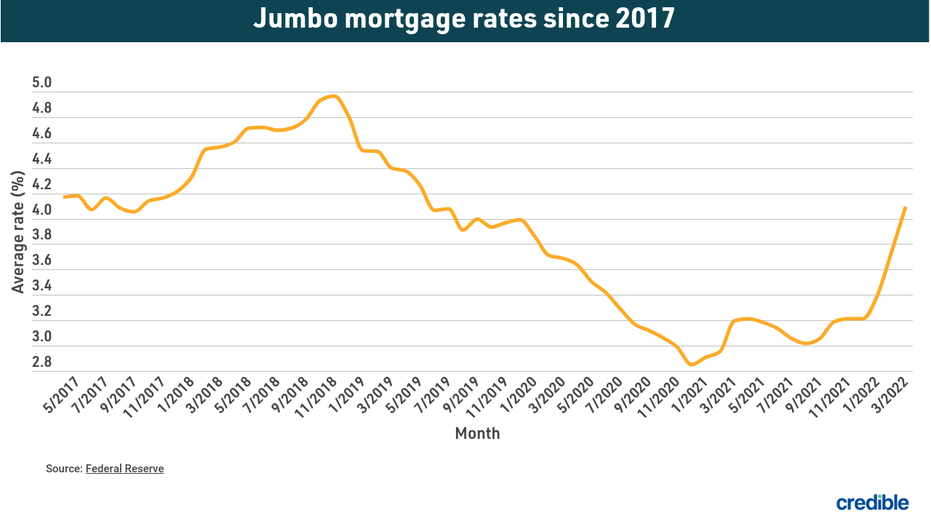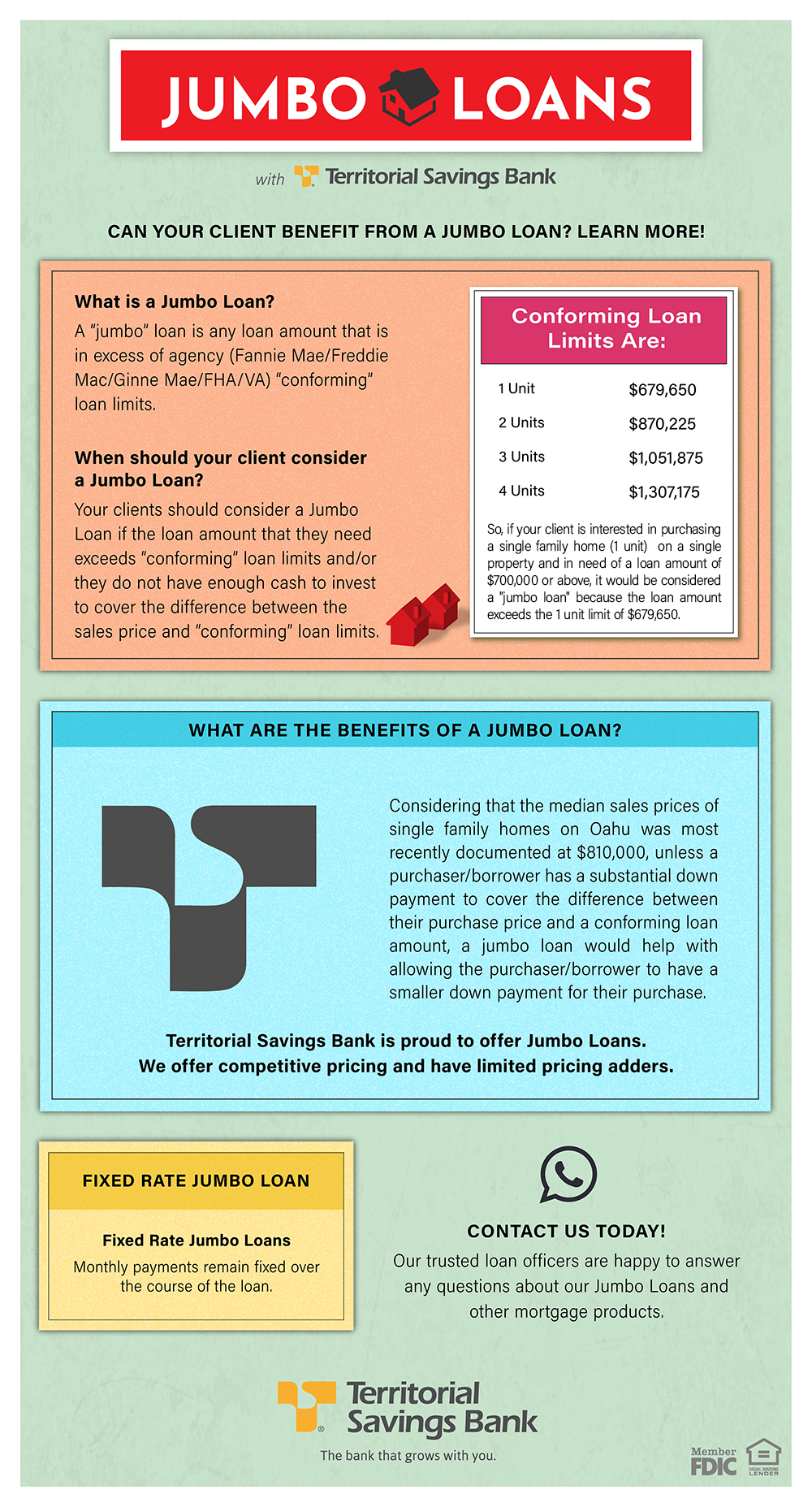Browsing the Jumbo Finance Landscape: Necessary Insights for First-Time Homebuyers
Navigating the complexities of big loans presents an unique set of challenges for first-time homebuyers, particularly in a progressing property market. Recognizing the crucial qualification requirements and possible advantages, along with the disadvantages, is vital for making informed choices. In addition, creating a strong monetary technique can significantly enhance your leads. Involving with professionals in the area can brighten paths that may initially appear intimidating. Yet, as you check out these complexities, it becomes clear that a much deeper understanding can disclose possibilities that may otherwise be neglected. Exactly how can you best setting on your own for success in this specialized sector of financing?
Comprehending Jumbo Car Loans

Because big car loans are not backed by government-sponsored entities, they bring various underwriting criteria and require even more detailed financial paperwork. This difference can lead to greater rate of interest compared to conventional finances, offered the raised threat to loan providers. Nevertheless, big fundings also supply special benefits, such as the ability to finance higher-value residential or commercial properties and possibly much more adaptable terms.
Newbie buyers should likewise understand that safeguarding a big funding commonly requires a bigger deposit, typically varying from 10% to 20%. In addition, debtors are typically expected to demonstrate strong creditworthiness and a secure income to certify. Recognizing these subtleties can empower first-time homebuyers to make educated choices when exploring jumbo funding choices in their search of homeownership.
Eligibility Demands
Securing a big loan calls for conference details eligibility requirements that vary considerably from those of traditional loans. Unlike traditional finances, which are often backed by government-sponsored entities, big car loans are not insured or assured, causing stricter criteria.
One primary need is a higher credit history. Lenders usually anticipate a minimum score of 700, although some may permit lower scores under certain conditions (jumbo loan). Furthermore, debtors must show a durable economic account, that includes a reduced debt-to-income (DTI) proportion, typically no greater than 43%. This makes sure that debtors can manage their regular monthly payments along with various other economic commitments.
Additionally, a lot of lending institutions require significant paperwork, including proof of earnings, possession statements, and income tax return for the past two years. A substantial down repayment is also vital; while standard loans may allow down payments as reduced as 3%, jumbo lendings often necessitate a minimum of 20%, relying on the lender and the financing quantity.

Benefits of Jumbo Loans
For several new homebuyers, big finances supply distinctive advantages that can help with the trip towards homeownership. Among the main benefits is the ability to fund buildings that exceed the adapting finance restrictions established by government-sponsored entities. This versatility makes it possible for customers to access a wider variety of high-value residential properties in affordable realty markets.
Additionally, jumbo finances frequently come with eye-catching rates of interest that can be reduced than those of typical fundings, specifically for borrowers with solid credit rating profiles. This can result in considerable financial savings over the life of the lending, making homeownership more cost effective. Big lendings link typically enable for greater funding quantities without the need for personal home mortgage insurance coverage (PMI), which can better lower regular monthly settlements and general expenses.

Potential Downsides
Many potential property buyers may locate that big loans featured substantial drawbacks that necessitate cautious consideration. One of the primary issues is the stringent certification standards. Unlike conforming financings, big fundings commonly call for higher credit rating, typically going beyond 700, and considerable income documentation, making them less accessible for some consumers.
In addition, big fundings usually feature greater rates of interest compared to traditional lendings, which can lead to increased month-to-month payments and overall loaning costs. This costs might be specifically difficult for first-time property buyers who are already browsing the monetary complexities of buying a home.
One more noteworthy disadvantage is the bigger down payment demand. Many lending institutions expect a minimum deposit of 20% or even more, which can present a difficulty for purchasers with restricted savings. Additionally, the absence of federal government backing for big car loans results in much less beneficial terms and problems, raising the risk for lending institutions and, subsequently, the borrowing prices for home owners.
Lastly, market variations can significantly impact the resale worth of premium residential properties funded with big loans, including an element of financial unpredictability that novice property buyers might find complicated.
Tips for First-Time Homebuyers
Navigating the intricacies of the homebuying procedure can be frustrating for novice customers, particularly when taking into consideration jumbo lendings (jumbo loan). To simplify this trip, sticking to some vital techniques can make a significant difference
First, enlighten yourself on jumbo finances and their details needs. Comprehend the various loaning criteria, including credit history, debt-to-income ratios, and down payment assumptions. Typically, a minimal credit report of 700 and a down payment of at the very least 20% are necessary for approval.
Second, involve with an experienced home loan professional. They can give understandings tailored to your financial scenario and help you browse the intricacies of the jumbo financing landscape.
Third, consider pre-approval to enhance your buying setting. A pre-approval letter signals to sellers that you are a severe customer, which can be useful in competitive markets.
Last but not Read Full Report least, do not forget the importance of budgeting. Consider all expenses connected with homeownership, including home taxes, upkeep, and home owners' insurance coverage. By adhering to these tips, novice customers can come close to the jumbo lending process with better confidence and clearness, boosting their possibilities of successful homeownership.
Verdict
To conclude, browsing the jumbo funding landscape calls for a comprehensive understanding of qualification criteria, advantages, and prospective drawbacks. New buyers can boost their possibilities of success by keeping a solid credit history, handling their debt-to-income ratio, and preparing for bigger deposits. Involving with knowledgeable mortgage professionals and obtaining pre-approval can additionally reinforce settings in open markets. Inevitably, thorough preparation and education relating to big financings can result in more enlightened decision-making in the go now homebuying process.
When navigating the intricacies of the real estate market, comprehending big loans is essential for novice property buyers aiming for homes that surpass standard loan limitations. Jumbo finances are non-conforming fundings that usually go beyond the adjusting loan restriction set by the Federal Real Estate Finance Firm (FHFA)Additionally, big lendings usually come with eye-catching interest rates that can be reduced than those of conventional lendings, specifically for borrowers with strong credit scores accounts. Jumbo lendings normally permit for higher funding amounts without the demand for private home mortgage insurance coverage (PMI), which can additionally reduce monthly repayments and general expenses.
Unlike adapting lendings, jumbo lendings generally need higher credit ratings, usually surpassing 700, and substantial revenue documentation, making them less accessible for some consumers.
Comments on “Jumbo Loan: Funding Solutions for Houses Above Conforming Boundaries”